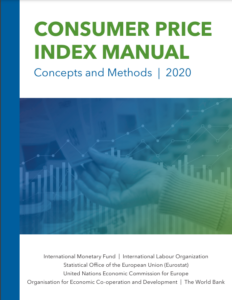Table of Contents
Related pages
Introduction
Consumer price indices (CPIs) measure changes over time in the prices of goods and services consumed by households. On ILOSTAT, CPI data are used to analyse price developments relevant to labour market outcomes, including real wages and purchasing power.
Data catalogue
| Indicator | Frequency | Database | Subject | Download (with labels) | Download (with codes) | Data explorer |
|---|---|---|---|---|---|---|
| National consumer price index (CPI) by COICOP (2017 = 100) | Annual | Prices, Costs and Currency Conversions (PRICES) | Consumer price indices | .csv .dta .xlsx | .csv.gz | |
| National consumer price index (CPI) by COICOP (2017 = 100) | Quarterly | Consumer price indices | .csv .dta .xlsx | .csv.gz | ||
| National consumer price index (CPI) by COICOP (2017 = 100) | Monthly | Consumer price indices | .csv .dta .xlsx | .csv.gz | ||
| National consumer price index (CPI) by COICOP, percentage change from previous period (%) | Quarterly | Consumer price indices | .csv .dta .xlsx | .csv.gz | ||
| National consumer price index (CPI) by COICOP, percentage change from previous period (%) | Monthly | Consumer price indices | .csv .dta .xlsx | .csv.gz | ||
| National consumer price index (CPI) by COICOP, percentage change from previous year (%) | Annual | Prices, Costs and Currency Conversions (PRICES) | Consumer price indices | .csv .dta .xlsx | .csv.gz | |
| National consumer price index (CPI) by COICOP, percentage change from previous year (%) | Quarterly | Consumer price indices | .csv .dta .xlsx | .csv.gz | ||
| National consumer price index (CPI) by COICOP, percentage change from previous year (%) | Monthly | Consumer price indices | .csv .dta .xlsx | .csv.gz | ||
| National consumer price index (CPI) by COICOP, country weights (%) | Annual | Prices, Costs and Currency Conversions (PRICES) | Consumer price indices | .csv .dta .xlsx | .csv.gz | |
| National consumer price index (CPI), annual rate of change (%) - discontinued | Annual | Consumer price indices | .csv .dta .xlsx | .csv.gz | ||
| National consumer price index (CPI), annual rate of change (%) - discontinued | Quarterly | Consumer price indices | .csv .dta .xlsx | .csv.gz | ||
| National consumer price index (CPI), annual rate of change (%) - discontinued | Monthly | Consumer price indices | .csv .dta .xlsx | .csv.gz | ||
| National consumer price index (CPI), monthly rate of change (%) - discontinued | Quarterly | Consumer price indices | .csv .dta .xlsx | .csv.gz | ||
| National consumer price index (CPI), monthly rate of change (%) - discontinued | Monthly | Consumer price indices | .csv .dta .xlsx | .csv.gz |
Latest posts
Methods

Prices, Costs and Currency Conversions (PRICES database)
Concise description of concepts and definitions, uses, sources and limitations for statistics on consumer prices, labour costs, and currency conversion factors.

Consumer Price Index Manual: Theory, 2025
This is the companion publication to the Consumer Price Index Manual: Concepts and Methods. The Theory publication provides a comprehensive overview of the conceptual and

Consumer Price Index Manual: Concepts and Methods | 2020
The manual provides an overview of the methods and practices national statistical offices should consider when making decisions on how to deal with the various problems in the compilation of a consumer price index (CPI). It is an update of the 2004 CPI manual.

COVID-19 Guidance for labour statistics data collection: Consumer Price Indexes
The COVID-19 crisis is affecting data collection activities of national statistical offices (NSOs) around the world, including for consumer price indexes (CPI).

Consumer Price Index Manual. Theory and Practice.
This comprehensive manual provides guidelines for statistical offices and other agencies responsible for constructing CPIs and explains in-depth the methods that are used to calculate a CPI. It also examines the underlying economic and statistical concepts and principles needed for making choices in efficient and cost effective ways and for appreciating the full implications of those choices.

Handbook on Residential Property Prices Indices (RPPIs). 2013 edition
This handbook provides comprehensive guidelines for the compilation of RPPIs and explains in depth the methods and best practices used to calculate an RPPI. It also examines the underlying economic and statistical concepts and principles guiding the methodological choices on which the indices are based. The handbook primarily addresses official statisticians in charge of producing RPPIs, and provides a harmonized methodological and practical framework for all parties interested in their compilation. Written by leading academics in index number theory and by recognized experts in RPPIs compilation, this handbook was co-ordinated by Eurostat, with the collaboration of the ILO, the IMF, OECD, UNECE and the World Bank.

Sources and Methods Volume 1: Consumer price indices (2013)
Volume 1 of Sources and Methods: Labour Statistics presents methodological descriptions of the main characteristics of national series of consumer price indices. The 2003 edition is a revised, enlarged and updated version of the 1992 edition and contains descriptions for 169 countries, areas and territories.





